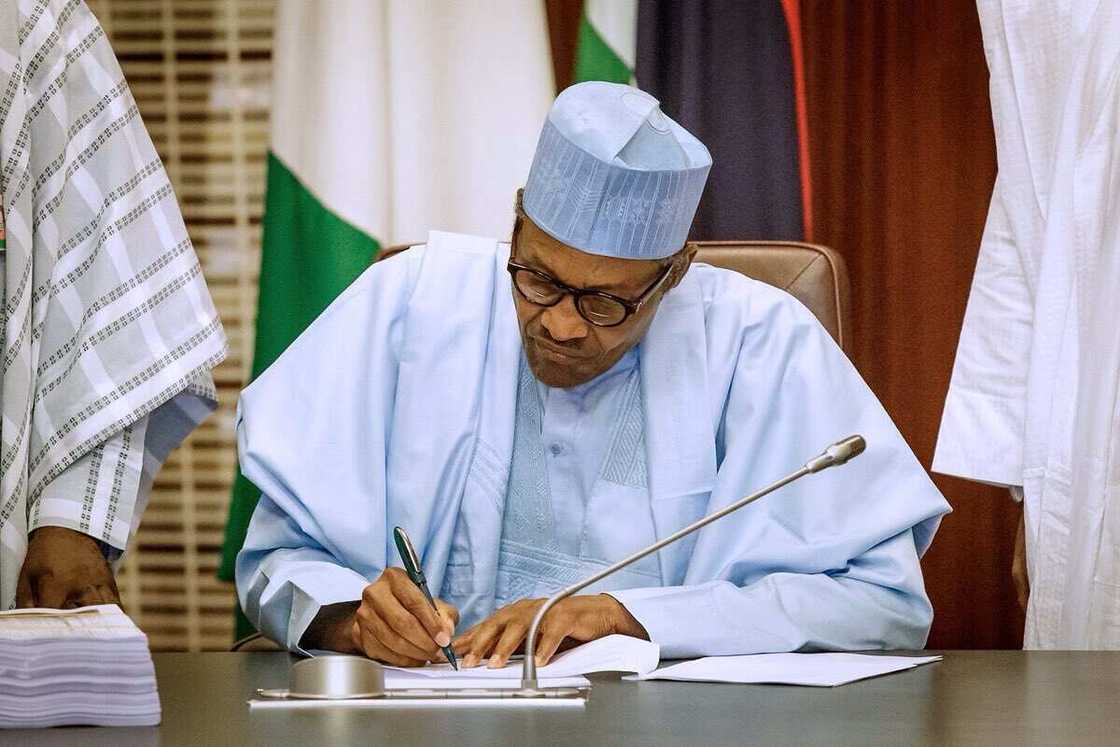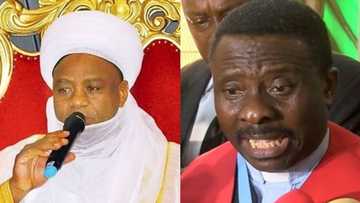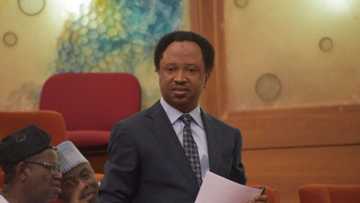Essentiality of presidential assent to federal audit service commission bill by Gift Olivia Samuel
Editor's note: Journalist and writer, Gift Olivia Samuel, writes on the need for President Muhammadu Buhari to assent to the Federal Audit Service Commission Bill as a way of strengthening Nigeria's laws against corrupt act by public service officials.
Read below:
PAY ATTENTION: Click “See First” under the “Following” tab to see Legit.ng News on your Facebook News Feed
The Federal Audit Service Commission (FASC) Bill which is expected to strengthen the Office of the Auditor-General for the Federation (OAuGF) in ensuring probity and accountability in government agencies, was passed by the 8th National Assembly and forwarded to President Muhammadu Buhari for assent but the president did not assent to the bill nor communicate to the National Assembly why he is yet to sign the bill.
This bill, when given assent, will empower the Office of the Auditor-General for the Federation which has the constitutional mandate of auditing all accounts of the federation to nip corruption in the bud, ensuring transparency in government transactions. Also, the bill will address acute manpower shortage existing in the office of the Auditor-General for the Federation and bring it in tandem with Supreme Audit Institutions (SAIs) and international best practices as obtained in other climes.
Passage of the bill was sequel to the presentation and consideration of a report by the Senator representing Edo South Senatorial District, Senator Matthew Urhoghide, who led a committee on public accounts during the plenary. For Urhoghide, the bill is very important to the nation, and when passed into law, it would form the bedrock for fighting corruption.

Source: Twitter
The Office of the Auditor-General for the Federation is a separate and independent entity whose existence, powers, duties and responsibilities are provided for under section 85 of the Constitution of the Federal Republic of Nigeria (CFRN) 1999. Section 85(2) of the CFRN 1999, provides that the Public Accounts of the Federation and of all Offices and Courts of the Federation shall be audited and reported on by the Auditor-General who shall submit his report to the National Assembly; and for that purpose, the Auditor-General or any person authorized by him in that regard shall have access to all the books, records, returns and other documents relating to those accounts.
Similarly, section 85(4) of the constitution stipulates that the Auditor-General shall have power to conduct periodic checks on all government statutory corporations, commissions, authorities, agencies, including all persons and bodies established by an Act of the National Assembly. However, Section 85(3) of CFRN 1999 prohibits the AGF from auditing the accounts of government statutory corporations, commissions, authorities, agencies, including all persons and bodies established by an Act of the National Assembly, limiting the Auditor-General's oversight powers to only —providing such bodies with a list of qualified auditors and to comment on their annual accounts and auditor’s reports.

Read also
This is what we'll do against Covid-19 - CAN, NSCIA speak as FG lifts ban on churches, mosques
The mission of the OAuGF which is, "To audit the nation's accounts in the most professional and transparent manner, ensuring value for money in government financial activities for the benefit of the Nigerian people", is not being achieved, as several Ministries, Agencies and Departments (MDAs) often fail to submit their audited financial statements. Recently, it was reported that the chairman, committee on public accounts, Honourable Oluwole-Oke, the committee investigating allegations of deliberate and reckless refusal by non-treasury funded MDAs to render accounts to the Office of the Accountant-General to the Federation (OAuGF), disclosed, during an investigative public hearing into the audit reports of MDAs, that in 2016 alone, 323 MDAs failed to submit their audited reports to the OAuGF compared to 215 unsubmitted reports in 2015; 148 in 2014; 109 in 2013; 85 in 2012; and 76 in 2011.
“Between 2010 and 2015, the Auditor-General’s Reports for these years were lying cold at the NASS without any action", he said. "In 2016 Auditor-General’s Reports were received in July 2018, after a two-year delay. The Reports of 2017 were received by the National Assembly in 2019. Despite the fact that we are in 2020, 2018 and 2019 Reports are yet to be presented to the National Assembly".
With the MDAs' failure to submit their audited reports to the OAuGF, it is crystal clear that the Auditor-General's Office—the Supreme Audit Institution of Nigeria— currently lacks the oversight powers to enforce its mandate and sadly, there are no sanction measures against these MDAs which are defaulting, nor agencies responsible for prosecuting defaulters— an act that can totally lead to gross financial recklessness and public fund embezzlement, thereby depriving the Nigerian government and people of money needed for development, in sectors such as Education, Health as well as others.
It is no longer news that assent to the FASC Bill will empower the OAGF to issue audit queries and direct the withholding of emoluments and allowances due to defaulters after 30 days of issuance of the query by which the person is deemed to have failed to comply; Summon persons to appear before it to give evidence, orally or in writing, and where such person fails to appear without reasonable excuse, to issue a warrant to the Police for the arrest of such person. It also penalises persons who give false evidence or refuse to take a witness oath or affirmation.
Meanwhile, it has become necessary for President Muhammadu Buhari to assent the Federal Audit Service Commission Bill that enhances the capability of the Office of the Auditor-General to execute its constitutional mandate of ensuring transparency, accountability and probity in the management of public funds. The non-assent to the bill by President Buhari who is an anti-corruption champion, calls for concern as it appears as though the president is not taking the anti-corruption fight seriously.
In the 2019 presidential campaign, the Buhari-led APC with the CHANGE agenda had promised to fight corruption. Also, in 2018 President Buhari was named the anti-corruption champion by the African Union— a responsibility which puts him on the spot to do more and to give the anti-corruption agenda the attention it truly deserves, but his body language towards the assent to this Bill, which has been on his table over a year and which he has blatantly ignored, calls into question his anti-corruption mantra and zeal to fight corruption to a standstill in Nigeria.
Assent to the Audit Bill, which seeks to enhance efficiency and effectiveness, and also guarantee administrative and financial autonomy to the Office of the Auditor-General for the Federation is now a matter of urgency, which is why organizations such as Connected Development (CODE) is mounting pressure on the president and the Senate to assent to the Bill which has been ignored for too long.
CODE, led by Hamzat Lawal is currently urging citizens to sign a petition calling for the Nigerian Senate and the presidency to assent to the bill, review budgetary process, as well as Repeal section 85(3) of the constitution, which prohibits the OAuGF's power to audit statutory corporations and bodies, and to Subject the Office of the OAuGF and the audit commission to the Freedom of Information Act (except in matters specifically precluded under Sections 11- 17 of the Act).
PAY ATTENTION: Install our latest app for Android, read the best news on Nigeria’s #1 news app
Also, CODE in collaboration with OXFAM Novib is working in advancing the cause of transparency and accountability on this issue through its Money Trail Project which is mobilizing the Nigerian population against corruption. Using the hashtag #AuditMoneyTrail, the project is creating awareness on the urgency for the Nigerian president to assent to the Federal Audit Service Commission Bill that repositions the Office of the Auditor-General of the Federation and enhances the capability of the Office to execute its constitutional mandate of ensuring transparency, accountability and probity in the management of public funds, and establish an audit act in accordance with international best practices.

Read also
Opinion: 4 times Aisha Buhari criticised her husband, APC-led government by Rahaman Toheeb Abiola
It is also advocating for Ministries, Departments and Agencies to submit their yearly audited financial accounts to the Auditor General of the Federation, hence preventing corruption, illicit financial flows, money laundering and mismanagement of public funds as reported in the Malabu and Dan Etete case.
Nigeria would have made considerable headway on its fight against corruption if the FASC Bill had been passed into law. To achieve this feat, a more strategic approach and increased advocacy is required to get the presidential assent.
The 9th Assembly should make extra efforts to liaise with the president to ensure assent to the Bill; Civil Society Organizations should mount pressure on President Buhari to assent to the bill just as CODE is currently doing, and the media is not left out in this advocacy to see to the accelerated assent to the bill.
Nigerians have a role to play by lending their voices and supporting organisations such as CODE to sign the petition, so as to ensure speedy assent to the bill. If this bill becomes a law, Nigeria stands to benefit hugely as it will see to it that corruption is drastically reduced, leakages plugged, corrupt people, exposed and prosecuted, and the money channelled to improving sectors such as education, health and others.
Your own opinion articles are welcome at info@corp.legit.ng— drop an email telling us what you want to write about and why. More details in Legit.ng’s step-by-step guide for guest contributors.
Contact us if you have any feedback, suggestions, complaints or compliments. We are also available on Twitter.
'Nigeria needs a leader, not a president' | Legit TV
Source: Legit.ng





